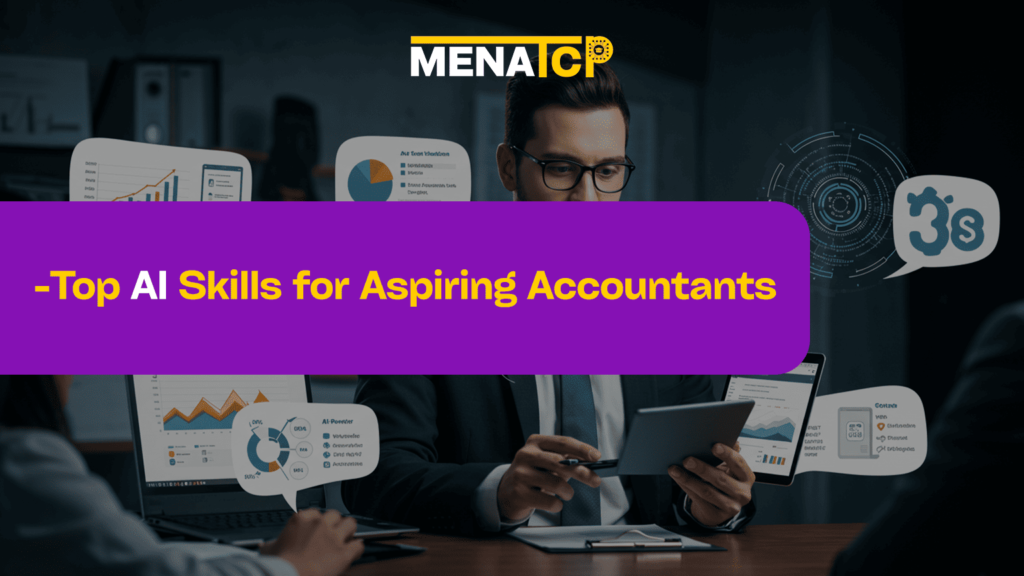
Embracing the changing world of Artificial intelligence (AI). It’s apparent that AI is revolutionizing the accounting and finance sectors by enhancing efficiency, accuracy, and strategic decision-making. If you’re looking to be an accountant or trying to obtain your CIA certification. Aspiring accountants must understand the growing importance of AI tools for accounting and finance, which are transforming traditional processes such as accounts receivable and managerial accounting. The benefits of AI in accounting extend to automating repetitive tasks, improving financial forecasting, and ensuring compliance with ethical standards. This isn’t about replacing your job but instead about the skills you need to acquire in the changing job market of AI and finance. In this blog we will discover the skills you need to help you with AI.
Embracing the changing world of Artificial intelligence (AI). It’s apparent that AI is revolutionizing the accounting and finance sectors by enhancing efficiency, accuracy, and strategic decision-making. If you’re looking to be an accountant or trying to obtain your CIA certification. Aspiring accountants must understand the growing importance of AI tools for accounting and finance, which are transforming traditional processes such as accounts receivable and managerial accounting. The benefits of AI in accounting extend to automating repetitive tasks, improving financial forecasting, and ensuring compliance with ethical standards. This isn’t about replacing your job but instead about the skills you need to acquire in the changing job market of AI and finance. In this blog we will discover the skills you need to help you with AI.
1- Tech Adaptability:
Using AI tools for accounting and finance requires a good foundation in technology. Familiarity and experience in using AI-based accounting software such as QuickBooks, Xero, or Sage is important. Also, staying flexible and adaptable to new technologies and learning to use them effectively is essential to remain competitive in an evolving market such as AI.
2- Critical Analysis:
Dealing with the amount of documents is part of the accountant’s routine. While there are benefits of AI in accounting where AI can take over such repetitive tasks as data entry, accountants should possess strong analytical skills to interpret the generated financial insights and still have the ability of decision-making.That’s why It’s worth reminding that the human factor remains important to complement the use of AI.
3- Knowledge of Cybersecurity:
AI can enhance everyday tasks but this comes with data vulnerability as AI has access to a lot of your data. Accountants must be knowledgeable in cybersecurity practices to protect sensitive financial information. Understanding encryption, secure networks, and potential threats are important to safeguard your data.
4- Decision-Making skills:
While using AI tools for accounting , accountants must ensure ethical considerations to prevent bias in their operations. That’s why human judgment is essential in situations where ethical dilemmas arise, ensuring that the ethical side is addressed so that the use of artificial intelligence in accounting is trusted.
5- Data Analytics:
The use of AI tools for accounting relies on data. While it can collect and deal with large amounts of data it can’t understand the nuances of what the data means. Accountants who can analyze data, identify trends, and decide actionable insights are highly valued. Knowing about the correlations in data is one thing, but understanding why this is happening is another and being able to make decisions based on these data is where the role of accounting professionals comes in.
To develop your AI skills in accounting, start by exploring popular AI tools for accounting and finance, Understand the benefits of AI in accounting, including increased accuracy, efficiency, and enhanced decision-making and here’s some tips:
1) Education and Training:
Enroll in courses that cover the basics of AI, machine learning, and data analytics. Pursue certifications that focus on the integration of AI technology in accounting.
2) Data Literacy:
Learn how to collect, clean, and analyze data. Familiarity with data structures, databases, and data management tools is crucial. Get proficient in using analytical tools and software.
3) AI and Automation Tools:
Gain hands-on experience with AI-enhanced accounting software that uses AI tools for accounting and finance.
4) Continuous Learning:
Follow industry news,publications and subscribe to accounting and tech journals, Also participate in webinars and conferences related to AI and accounting. Take account of the fact that learning is a lifelong journey and you can learn through professional development courses, workshops, and seminars focused on emerging technologies in accounting.
5) Ethical AI Understanding:
Learn about the ethical considerations of using artificial intelligence in accounting, such as the ethical impact of artificial intelligence in managerial accounting, data privacy, bias in AI models, and the impact on employment. Stay informed about regulatory changes related to AI and data usage in accounting. Ensure that AI applications comply with relevant laws and standards.
While the use of artificial intelligence in accounting is the future it’s important to take into account the ethics of its usage and how to navigate it correctly to ensure their safe use and application.
© MENATCP, 2025. All Rights Reserved | Developed by MG Digital